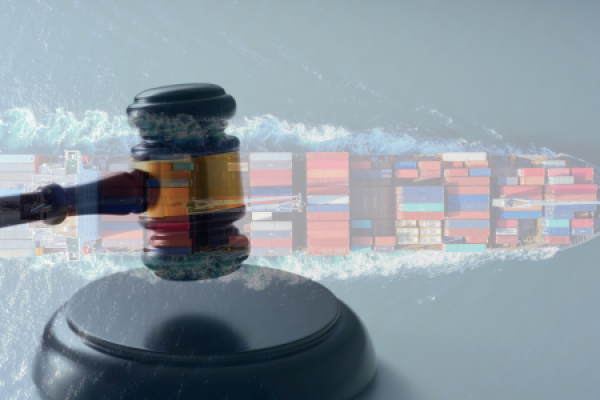
Panagiotis Adamos
Published: March 05, 2025
Background
On 27 October 2020 the container vessel “Maersk Launceston” (the “Vessel”), while outbound from the port of Piraeus collided with the “Kallisto”, a Greek Navy minehunter. The minehunter was left heavily listing to starboard with its stern torn off and two members of the crew on board the minehunter were injured.
On behalf of the Greek Navy the Greek State arrested the Vessel for security in the amount of € 120 million. Following that, the State filed a lawsuit against the Master and the Owners of the vessel before the Greek courts claiming damages of €75 million. The Owners of the Vessel then applied to limit its liability pursuant to paragraphs 1 and 4 of Article 1 of the 1976 Convention on Limitation of Liability for Maritime Claims1 (the “Convention”) by filing a petition. Furthermore, the Owners constituted a limitation fund at approximately €33 million by making a public deposit to the Deposits and Loans Fund and establishing a deposit note in favour of the beneficiaries2.
Article 1 – Persons entitled to limit liability
Shipowners and salvors, as hereinafter defined, may limit their liability in accordance with the rules of this Convention for claims set out in Article 2.
….
….
If any claims set out in Article 2 are made against any person for whose act, neglect or default the shipowner or salvor is responsible, such person shall be entitled to avail himself of the limitation of liability provided for in this Convention.
Article 4 of the Convention: What is the conduct that bars limitation?
The Greek Supreme Court considered Article 4 of the Convention in order to answer the following question:
Can shipowners effectively limit their liability under the Convention for losses arising out of a collision caused from the personal reckless and negligent acts of the Master during the navigation of their vessel?
Article 4 reads:
“A person liable shall not be entitled to limit his liability if it is proved that the loss resulted from his personal act or omission, committed with the intent to cause such loss, or recklessly and with knowledge that such loss would probably result.”
Greek State’s (claimants’) Arguments
The State presented two main arguments on why Owners should not have the right to limit their liability:
That the Master’s gross negligence and reckless conduct during the navigation and management of the vessel constitutes a personal act of the Owners, committed recklessly and with knowledge that such loss would probably take place. Owners had employed a manifestly incompetent and unsuitable Master with knowledge of his incompetence and of the possibility that such losses would probably arise. Additionally, Owners had failed to properly train the crew and the Master on their duties and obligations during navigation.
That, since the Piraeus Port Authorities issued several fines to the Master for his breach of the ISM Code during the navigation, this essentially constituted proof of the personal wilful or reckless acts or omissions of the Owners themselves.
Decision of the Supreme Court
The Piraeus Court of First Instance, the Court of Appeal3 and the Supreme Court all reached the same conclusion by upholding and confirming Owners’ right to limit liability at around EUR 33 million.
The Supreme Court accepted that the State failed to provide sufficient evidence which would prove that the Master’s personal acts or omissions should be imputed back to Owners. The State failed to prove that any persons legally representing Owners and maintaining the relevant authority for the employment and manning of the vessel, had committed personal acts or omissions by employing crew that were alleged to be manifestly incompetent and unsuitable. On the contrary, Owners successfully proved that the company was fully diligent in all respects by employing qualified personnel. Owners had provided, for that purpose, all the necessary certificates in support of the crew’s and the Master’s expertise and training.
Furthermore, the Supreme Court ruled that, while the fines imposed on the Master by the Port Authorities might prove the negligent acts and omissions of the Master, they do not constitute proof of personal reckless acts or omissions of the Owners (especially in circumstances where no relevant fine was imposed directly on the Owners’ company).
For all the above reasons it was decided that although the Master had been negligent for the incident, Owners had not committed any personal acts or omissions either with the intention to cause the relevant losses or recklessly and with knowledge that these losses would probably occur. As such, the requirements of article 4 of the LLMC 1976 Convention had not been met and Owners were entitled to limit liability under Article 1 of the Convention.
Key Observations
What the Greek Supreme Court reaffirmed with its decision number 1806/2023 is that limiting liability for maritime claims under the LLMC 1976 Convention is not the exception, it remains the rule. Essentially, Greece as a contracting State to the Convention, upheld the very idea behind the Convention, meaning that shipowners’ liability can be limited in all circumstances, save for those prescribed under article 4. As such, any wilful or reckless act or omission committed with intent to cause loss, or knowledge that loss would probably result, has to be personal to the shipowners in order for them to lose the right to limit liability, in the sense that they must have personally misconducted themselves in a specific manner.
As an aside, it is worth mentioning that a recent development in Greek maritime law will positively affect the procedure of setting up a limitation fund, although this was not an aspect of the subject dispute. In this case the limitation fund was set up by use of a bank guarantee, since IG Club LOUs were not accepted for this purpose under the previous law, which was applicable at the time of the incident and of the subject judgement. By virtue of the new Private Maritime Law Code (Law No. 5020/2023) which came into force on 1 May 2023, P&I Clubs’ LOUs can be used to set up a limitation fund, in addition to cash deposits and bank guarantee letters. This is an extremely positive development which will not only speed up the process of setting up a limitation fund in Greece, but also will strengthen the status of a Club LOU in a jurisdiction where Club LOUs are still not accepted as a form of guarantee to lift arrests on vessels. In fact, Steamship Mutual is about to become the first IG Club to affect the setting up of a limitation fund on behalf of one of its Members via the use of a Steamship LOU.
The Court’s decision is reassuring for the Greek shipping community after a previous ruling of the Piraeus Court of First Instance4, where the Court decided that the recklessness of the master amounted to reckless acts or omissions of the shipowners who therefore should be denied the right to limit liability. In a judgment that had raised several concerns the Court of First Instance had not in that case attempted to interpret Article 4.
This decision is also important as an indicator of how other contracting parties, Courts and Tribunals would potentially interpret and apply the Convention5.
For instance, it is interesting that the Greek Courts approached the question of “whose acts in a company could be regarded as acts of the company itself” in a similar manner as the “directing mind and will of the company” doctrine of English law. Under English law the “alter ego” test would require that the status of a person within the hierarchy of the company must be such that their acts or omissions may be properly regarded as being acts or omissions of the company itself6. Merely the acts of the company’s employees would most likely not satisfy this test if these employees do not qualify as designated persons who have access to the highest level of management within the company7.
As a note of caution the decision does not mean that crew negligence could never constitute a shipowners’ personal wilful or reckless conduct. The Supreme Court in the subject case clarified that the claimants did not sufficiently discharge their burden of proof, which under article 4 of the Convention rests with the person making the claim.
It is important to always keep in mind the fact-sensitive nature of each case when challenges are made to the right to limit liability under the LLMC 1976 Convention. In any event the Supreme Court’s decision has reaffirmed a well-established position, and that successful challenges to a shipowner’s right to limit liability under the Convention are very rare.
1 The LLMC 1976 was amended by the 1996 Protocol, which falls outside the scope of this article. For more information on the Protocol please visit: https://www.steamshipmutual.com/publications/articles/articles/llmc_96prot_sh0304
2 Under the old Greek Private Maritime Law Code of 1958, which was in force at the time of the incident and the hearings, a limitation fund in Greece could be set up only via a cash deposit or a bank guarantee letter in the form of a public deposit. For the current status please see below under the Key Observations.
3 Decisions 234/2021 and 48/2022 respectively. This article, refers only to the findings of the Supreme Court, since that decision is binding upon the subordinate Courts.
4 Decision 1291/2018: In that case the master acted recklessly by insisting on the dragging of a submarine cable, despite the fact that he was aware of the resistance observed during the process of lifting the vessel’s anchor.
5 For an English law interpretation, one may read Lord Hoffmann’s judgment in Meridian Global Funds Management Asia Ltd v Securities Commission [1995] 3 All ER 918.
6 The Marion [1984] 2 Lloyd’s Rep 1, The Lady Gwendolen [1965] 1 Lloyd’s Rep 335.
7 For more information on that please read John F. Wilson’s Carriage of Goods by Sea, 7th edition, paras 12.2.4.


